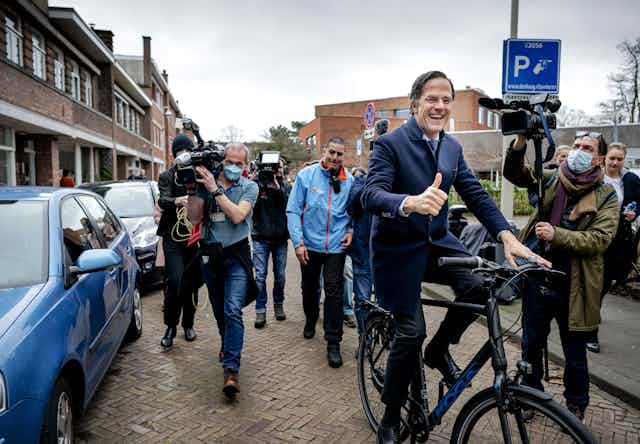For the fourth time in a row, the liberal-conservative party VVD has won the Dutch general elections. Prime Minister Mark Rutte, one of the longest serving leaders in Europe, will hold on to that status despite a tumultuous year.
The VVD’s victory was predicted but the electoral gains made by one of its coalition partners in the last government – the social liberal D66 – were more surprising. Led by Sigrid Kaag, a multilingual former diplomat and ardent supporter of the European Union, D66 has become the second largest party in the Netherlands. That could force Rutte to orientate his future policy in a more pro-European direction.
As Rutte ruled out any form of cooperation with the two main radical right-wing parties – Geert Wilders’ Party for Freedom (PVV) and Forum for Democracy (FVD) – he will have to engage with others. And in an increasingly fragmented political landscape, the VVD has more parties to choose from than ever. The 150-seat Dutch parliament will have 17 parties after this election result. It might take a while to form the government but it will probably end up being a broad continuation of the last. That means the VVD and D66 working with the Christian Democrats (who lost a few seats). They’ll need one other party to obtain a parliamentary majority.
But anyone thinking these results spell the end of nationalist-populist movements in the Netherlands should look closer. The PVV lost a few seats but if you combine its vote share with those of two other more recently established radical parties – JA21 and FVD (the only party that campaigned on anti-lockdown and anti-vaccination rhetoric) – the Dutch far right has won more seats than ever before.
Beware the opposition
In such a fragmented political landscape, opposition is a competitive yet interesting place to be. Holding a governing coalition together is difficult at the best of times, but Rutte has to tread the line between a large number of parties. That leaves space for radical right parties to continue to build their electoral prospects while presenting themselves as outsiders. They can propose radical change and criticise the government over an array of issues – including the poor quality of welfare state services, financial aid being sent to other countries and a lack of law and order – without having to assume any responsibilities.
Both within the Netherlands and beyond, this diversity of issues enables the far right to thrive. That’s because their constituency, too, is highly diverse.
To better understand the diversity behind the radical right vote, I travelled through France and the Netherlands for several years, holding in-depth interviews with 125 citizens who supported Wilders and France’s Marine Le Pen. The backgrounds of the voters I spoke with differed enormously. Some were highly educated, others less so, Some were old, some were young. Some were millionaires living in penthouses and others were unemployed and in social housing.

Voters with different profiles turned out to hold very different motives for voting for the same party. For instance, citizens I met in socially disadvantageous positions (low levels of education and income) principally claimed that they were unfairly disadvantaged with respect to migrants and asylum seekers. They particularly spoke about social housing, health care and elderly care in this context.
By contrast, small business owners and employees in the private sector were less likely to believe that they received too little. Instead, they said they felt they gave too much, especially to non-native outgroups who were believed to violate their work ethic – such as “lazy Greeks”, “profiteers in Brussels”, and “fortune seekers” benefiting from their tax contributions. Other voters I spoke to from the more well-off segments of society primarily voted PVV based on ideological considerations. They were denouncing non-native outgroups (especially Muslims), who they felt lacked the willingness to assimilate into (and so threaten) the native majority culture.
The key to understanding Wilders’ continuing electoral appeal, and that of his political allies, lies in the particular way in which he taps into these variegated demands. He invokes an overarching opposition between native-versus-foreign in different issue domains, including identity, European integration, Islam, security and welfare chauvinism.
Like other nativist leaders, he opposes a broad “us” – including, in his case, the “hardworking”, “elderly”, “Judeo-Christian” as well as “ordinary” Dutch – to a broad range of non-native outgroups (“them”), that would threaten “our” traditions, freedom, identity and prosperity. Precisely this overarching opposition allows his diverse voters to identify themselves with the same nativist agenda.
In other words, Wilders’ boundaries between “us” and “them” are multiple and flexible (as the PVV-leader recently illustrated, during the COVID crisis, when attacking the Dutch government’s decision to financially support Italians rather than its own population). Yet they are all based on the same nativist principle, according to which “our people” should be put first.
Post-pandemic politics
Rutte has held onto his popularity by presenting himself as the national crisis manager who pragmatically steered his country through the pandemic. But at some point, a debate on political accountability will unavoidably unfold, including questions on how well prepared his government was for the crisis. This blame game might negatively affect the next government, especially if the composition of the coalition is similar to the last government.
At some point other political issues will return to the fore and the far right will be on more comfortable political ground. When migration begins to rise again after the pandemic, for example, Wilders will be reminded of how he soared in the polls during the refugee crisis of a few years ago. Similarly, the nativist right will see an opportunity in any talk of post-pandemic financial “solidarity” between European nations.
Comfortably installed in the opposition benches, Dutch MPs on the radical right will be more numerous than ever. They shouldn’t be expected to fade into obscurity in the years to come.

